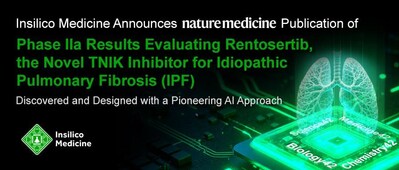- Phase IIa study results of Rentosertib were published simultaneously in Nature Medicine(IF = 58.7) and presented at the American Thoracic Society (ATS) 2025.
- Encouraging clinical data showed that patients receiving 60 mg QD Rentosertib experienced the greatest mean improvement in lung function, as measured by forced vital capacity (FVC), with a mean change of +98.4 mL, compared to a mean decline of -20.3 mL in the placebo group.
- Exploratory biomarkers analyses further validated the biological mechanism of TNIK, the novel target identified through a generative AI approach, supporting Rentosertib’s potential anti-fibrotic and anti-inflammatory effects.
, /PRNewswire/ — Artificial intelligence (AI) is rapidly transforming the pharmaceutical industry, reshaping the landscape from target identification to personalized medicine, and unlocking unprecedented opportunities to accelerate drug discovery and delivery. Despite growing adoption, only a few AI-discovered or AI-designed drug candidates have advanced to clinical trials, and even fewer have demonstrated clinical proof-of-concept.
The results revealed dose- and time-dependent changes in serum protein levels and FVC after 12 weeks of treatment, further supporting Rentosertib’s anti-fibrotic and anti-inflammatory effects. In the high-dose group, profibrotic proteins such as COL1A1, MMP10, and FAP were significantly reduced, while the anti-inflammatory marker IL-10 was increased. Notably, these protein changes correlated with improvements in FVC. Collectively, these findings are consistent with preclinical observations and provide valuable guidance for dose selection and biomarker identification in future clinical validations.
The data from this study were presented in oral presentations and a poster presentation at the American Thoracic Society (ATS) 2025 International Conference. In light of these encouraging study results, Insilico has begun discussions with regulatory authorities to facilitate the prospective evaluation of Rentosertib in larger cohorts of patients.
By integrating advanced AI and automation technologies, Insilico Medicine has demonstrated significant efficiency improvements in practical applications, setting a benchmark for AI-driven drug research and development. Compared to the typical 2.5–4 years required in traditional drug discovery, Insilico’s 22 nominated candidate drugs from 2021 to 2024 took only 12–18 months on average to progress from project initiation to nomination of preclinical candidates (PCCs), with each project requiring synthesis and testing of only about 60–200 molecules. The success rate from PCC to IND-enabling stage reached 100%.
About Rentosertib (Known as ISM001-055)
Rentosertib is a potentially first-in-class small molecule targeting TNIK developed utilizing generative AI. In IPF, the activation of TNIK drives pathological fibrosis in the lungs, contributing to the progressive decline in lung function. By inhibiting TNIK, Rentosertib aims to halt or reverse fibrotic processes, offering a disease-modifying treatment for patients with IPF. The history of discovery, design and development including target discovery, generative chemistry, multiple in-vitro and in-vivo experiments as well as the results of Phase I clinical studies in human volunteers were published in a Nature Biotechnology article in March 2024.
About Idiopathic Pulmonary Fibrosis (IPF)
Idiopathic Pulmonary Fibrosis (IPF) is a chronic, scarring lung disease characterized by a progressive and irreversible decline in lung function. Affecting approximately 5 million people worldwide, IPF carries a poor prognosis, with a median survival of 3 to 4 years. Current approved treatments, including antifibrotic drugs, can slow disease progression but do not stop or reverse it, leaving a significant unmet need for more effective, disease-modifying therapies.
About Insilico Medicine
Insilico Medicine, a global clinical stage biotechnology company powered by generative AI, is connecting biology, chemistry, medicine and science research using next-generation AI systems. The company has developed AI platforms that utilize deep generative models, reinforcement learning, transformers, and other modern machine learning techniques for novel target discovery and the generation of novel molecular structures with desired properties. Insilico Medicine is developing breakthrough solutions to discover and develop innovative drugs for cancer, fibrosis, central nervous system diseases, infectious diseases, autoimmune diseases, and aging-related diseases. www.insilico.com
SOURCE Insilico Medicine

WANT YOUR COMPANY’S NEWS FEATURED ON PRNEWSWIRE.COM?
![]()
440k+
Newsrooms &
Influencers
![]()
9k+
Digital Media
Outlets
![]()
270k+
Journalists
Opted In



